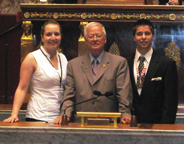Geneviève Pilon, uOttawa common-law student

From July 4 to 6, 2009, I had the privilege of representing Ontario, along with fellow student Marc Veilleux from the Faculty of Health Sciences, at the fifth session of the Parlement francophone des jeunes (PFJ), held this year in Paris, France. The PFJ takes place every two years and brings together two young adults--one man and one woman—between the ages of 18 and 23 from each of the member countries of the Organisation internationale de la francophonie (OIF).
The PFJ was launched by the Assemblée parlementaire de la francophonie (APF), an international organization composed of Francophone politicians from around the world. Though not recognized like Quebec as an independent OIF member, Ontario nonetheless gained permission to take part in the youth parliament for the first time this year. The precedent is the happy result of extensive talks between APF representatives and Jean-Marc Lalonde, Ontario MLA and chair of the Ontario chapter of the APF.
As the proceedings opened, the delegates were asked to select one of the topics assigned to its own special commission and to produce a short paper on the subject. Among the topics discussed this year were child soldiers, political parties and youth, and the financial crisis. Given my major in criminology and minor in globalization from my original degree in social sciences, I felt deeply compelled to address the issue of child soldiers.
Next, each commission was called on to convene in rooms adjoining the French Senate. Based on its discussions, our own commission then drafted a text with recommendations on how to counter the problem of child soldiers. All of the recommendations will be addressed at the next round of APF talks and ultimately submitted to the OIF executive council.
Photo caption: University of Ottawa students Geneviève Pilon and Marc Veilleux alongside Jean-Marc Lalonde, chair of the Ontario chapter of the Assemblée parlementaire de la francophonie